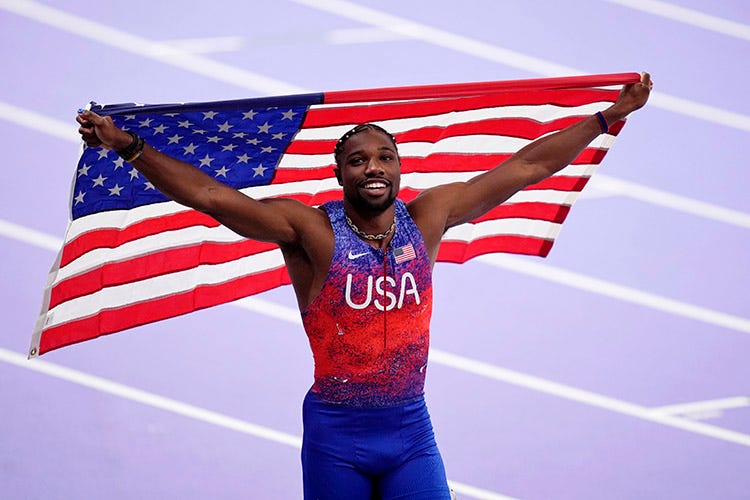SAINT-DENIS, France — Every gimmick, every cry for attention, every time he set himself up to be a meme and ridiculed, it made you wonder if Noah Lyles knew what he was getting himself into, what laid in wait on the other side of another stink bomb in Paris. It wouldn’t have been the end of the world. Life would have gone on. He would have continued to get sponsors, be famous, sprint around the world and live the life he wants.
But it would have felt so transparently like an act – and one that few would have had an appetite to see continue another four years.
Americans have been intrigued by Lyles, they’ve been entertained by Lyles, they’ve been bombarded with Lyles in every way, shape and form leading up to these Olympics.
But until Sunday here at Stade de France they’ve had little reason at the Olympics to do anything but roll their eyes at Lyles.
That all changed with a well-timed dip. With a fortunate lean. With a few thousands of a second.
One of the biggest trash talkers in American sports is now one of its biggest heroes. He ended a 20-year drought in the 100 meters. He officially buried his Tokyo flop. He won the gold.
Redemption, anyone?
“Oh, I knew once the year started, that this was not 2021,” Lyles said. “I knew every step of the way it was not 2021. I’m still constantly moving forward, moving forward, moving forward. And I knew that when the time came for me to be able to say, ‘This is the final, this is where I need to put together.’ I was going to do it.”
But he had to actually do it. And until literally the final stride, that seemed like it might not be possible.
Lyles didn’t win his preliminary heats. He looked like he might be off his game here in Paris. Others were in better form, and maybe, just maybe, all the pressure he heaped on himself trying to be Noah Lyles the transcendent superstar, rather than Noah Lyles the world’s best sprinter, might be getting to him on the stage you only get once every four years.
Here’s what I thought during introductions for the 100 when Lyles came hopping out of the tunnel and running almost at a full sprint for 20 yards or so: He’s trying too hard. Lyles always tries too hard.
A lot of people who don’t really know much about track would have only known the following things about Lyles. He talked about winning three gold medals in Tokyo, but only came away with one bronze. His focus shift to the 100 and the “world’s fastest man” moniker felt even more audacious. And, in a major pop culture faux pas, he went after NBA players for calling themselves “world champions” after winning the title because the NBA is a league and the world is the world.
Again, trying too hard. Making himself the country’s most annoying literalist. But also making himself famous.
Where one side of that coin begins and the other ends in this social media era, who can say? If Muhammad Ali had Twitter and YouTube instead of Howard Cosell, it might have gotten a little old too.
But if you can back it up on the track? That’s the jackpot of American zeitgeist.
Lyles knew it. He believed it. Then he did it. And even after all that talk, it stunned him a little bit he when it actually happened and his name flashed first.
“I’m gonna be honest, I wasn’t ready to see it,” he said. “And that’s the first time I’ve ever, like, said that in my head, like, I wasn’t ready to see it.”
People like Lyles usually see themselves dominating. Putting on a show because it’s all a show.
And it was indeed that, just a different kind than what anyone could have predicted.
He got out of the blocks slow.
“I’ve done worse,” he said.
Halfway through he looked dead in the water. Then the gap closed.
“When I saw where he was at 60, I was like ‘OK, we’re in the mix,’” his coach Lance Brauman said. “But I thought at 80, I was like, ‘Holy cow, he’s right there.’”
The finish was blur. It seemed like nearly the entire field hit the line together.
“Probably one of the best races I’ve been in in a long time,” Fred Kerley said. “It came down to whoever can dip the best at the last two meters.”
For several seconds, there was a hush.
No names were coming up on the scoreboard. The result of the biggest race of Lyles’ life was in suspended animation. He figured Jamaica’s Kishane Thompson probably had it.
“I went up to him after where we were waiting,” Lyles said. “I even said, ‘Bro, I think you got that one, big dog.’
The stakes here were higher than a gold medal. He doesn’t want to just be a sprinter, he wants to be a star. Those two things could only coexist if he hit the line first. After three years of talk, this was about reputation and redemption. “And then my name popped up,” he said. “And I’m like, ‘Oh my gosh, I’m amazing.’”

